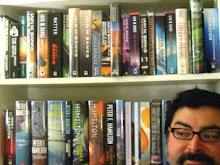Tuesday, July 9, 2013
The Barnes & Noble Hail Mary; or, How I Learned to Stop Worrying and Trust the Booksellers
I've only been to Book Expo America (BEA) once.
It was in 2004, when the convention was held in Chicago. It was a wonderful, exhilarating, exhausting time; I met many authors and people in publishing, found some great books. Those of you that have been to BEA know: the usual.
I was working at the venerable Elliott Bay Book Company and it was the legendary Rick Simonson and I representing the store. With so few of our staff going that year, there was a lot of ground to cover, so I was sent to sit in on some panels and meetings I usually wouldn't, for example the Bookstore owner's meeting/round-table. I was a bit intimidated, seeing all these owners and managers of the largest and most important bookstores in the nation. I resolved to listen and take faithful notes of the proceedings.
Until.
A bookstore owner stood up and asked, "how can we distinguish ourselves against Amazon and the chains?" (Remember, this was 2004). Heads turned and the silence stretched on. Meanwhile, my pulse was raising. "Really?" I thought to myself, "Is nobody going to say the obvious?" So after a few more seconds I said 'screw it' and stood up. I announced myself, my store, and said:
"It's obvious: It's your staff. Market your staff, their peculiarities, their tastes. You have this smart resource & you need to promote it more."
Then I sat down and continued to take notes. They half-heartedly talked about the idea a bit before moving on. I thought it was a smashing idea. But who was I, except a minor employee of a bookstore?
(Caveat: fast-forward a year or so later to Seattle's University Bookstore & its marketing campaign that year: Want to guess? Yep. They put photos of their staff members on the sides of buses and on posters. Coincidence? Maybe. It was a great campaign.)
All this preamble is to declare my thoughts on how to save Barnes & Noble. If Barnes & Noble is reading this:
To save itself, B&N should franchise.
Take existing locations and turn them into franchises, let owners/co-ops/collectives step in to buy in; let the locations start ordering their own front and back-list, to carefully tailor their selection to the interests of each neighborhood.
B&N's biggest challenge is the brutal reality of brick-and-mortar costs; their surge into supporting the Nook at the cost of floor-space & overall company budget was a huge mistake from the start. Customers started complaining about the reduction in section sizes and selection--never mind that they could have bought the e-books on a fancy Nook there in the store. When people step into a bookstore they expect to see books. B&N was juggling two different business models and now with the latest revelations and changes it turns out something had to give.
B&N (the corporation, not the on-the-ground staff) has been in the business of, not book-selling, but branding for the past decade. Why not just admit that and let the multitude of eager booksellers do what they do best. Independent bookstores are surviving because of their uniqueness.
Why am I trying to help B&N survive? When Borders went under in late 2011, thousands of passionate booksellers were out of jobs, a small percentage managed to get back into the industry, but the rest moved on to find other careers. It's all about the people.
And what of the cautionary tale that it's a bad idea to open a bookstore in the Age of Amazon? Bunk. According to the American Booksellers Association 43 new bookstore opened in 2012 alone. And small-scale chains are thriving too. Here's the latest on Diesel.
If B&N goes under, our culture loses just over 600 locations; 600 'third places'; and thousands of talented and knowledgeable staff.
Sure, bookstores will slip in to fill the void, but for the amount of Borders locations lost, the corresponding rise of independent bookstores has been much smaller. And what will happen in those communities in the meantime is that they will all get used to ordering from Amazon and we as an industry will have lost more customers. B&N has the infrastructure set up already. The owners of each location would shoulder the lion's share of the Brick-and-mortar expenses (not all, B&N should still have a stake in maintaining their stores), the training and hiring, etc. This frees up B&N to continue to 'brand' itself and pursue the Nook model without the distractions & demands of physical locations.
Another story: I was in a newly-opened bar in my neighborhood last week and the guys sitting next to me were peppering the bartender with questions about how long they'd been open, who the owners were, etc. At one point the bartender asked them a question and they answered that they own a couple of franchises. They didn't say which, but the most telling part of the conversation was this: One of the men said "Opening a bar sure is tough, franchises are much easier." Now imagine that conversation happening over owning a bookstore. Most of us dream about it but the reality is a lot of hard work (I know, I tried long ago).
The more bookstores we have out there in the world, the more chances we have to remind people why Amazon doesn't fulfill their book-reading needs. 'The enemy of my enemy', etc.
Subscribe to:
Posts (Atom)
